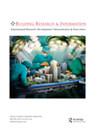对圆形设计的信任:利益相关者积极参与中国和荷兰住房改造项目
IF 3.7
3区 工程技术
Q1 CONSTRUCTION & BUILDING TECHNOLOGY
引用次数: 0
摘要
来自多方利益相关者的合作是在建筑环境中实现循环经济不同目标的先决条件。考虑到与可持续供应链、生产过程和消费模式相关的循环经济目标,获得被动户主的信任是社区一级住房改造的关键因素。本文以专家系统的信任概念为基础,探讨了提供者和住户在个人、技术和机构信任方面的积极作用,以及这是否有助于在住房改造中实施以用户为中心的循环设计方法。本研究借鉴了北京(中国)和阿姆斯特丹(荷兰)的实证数据。本文建议,在住房改造过程中,积极利用供应商和户主在所谓的接入点上的互动角色,可以将家庭的实践与循环建筑环境的不同目标联系起来。在建筑商、安装商和政策制定者之间建立个人信任,作为改造提供者和积极的住户,可以促进改造住房项目的共同所有权。增强对改造包原则的信任,通过通过社会互动加入产品验证来支持技术优化。在改造项目持续时间之后保持信任关系将有助于建立经得起未来考验的社区。本文章由计算机程序翻译,如有差异,请以英文原文为准。
Trust in circular design: active stakeholder participation in Chinese and Dutch housing retrofit projects
ABSTRACT Collaboration from multiple stakeholders is a prerequisite to achieve the different goals of a circular economy in the built environment. Gaining the trust of passive householders is a critical factor in housing retrofit at the neighbourhood level, given the aims of the circular economy related to sustainable supply chains, production processes and consumption patterns. Building on notions of trust in expert systems, this paper explores the active roles of providers and householders in personal, technological and institutional trust and whether this can help to implement user-centred circular design approaches in housing retrofit. This study draws on empirical data from Beijing (China) and Amsterdam (the Netherlands). The paper suggests that the active use of providers’ and householders’ interacting roles at so-called access points in the housing retrofit process could link the practices of households to the different goals of a circular built environment. Building personal trust between constructors, installers, and policymakers as retrofit providers and active householders can contribute to the shared ownership of retrofit housing projects. Enhancing trust in the principles of retrofit packages supports technology optimization through joined product validation via social interactions. Maintaining trust relations that last beyond the retrofit project duration will contribute to future-proof communities.
求助全文
通过发布文献求助,成功后即可免费获取论文全文。
去求助
来源期刊

Building Research and Information
工程技术-结构与建筑技术
CiteScore
8.60
自引率
7.70%
发文量
43
审稿时长
>12 weeks
期刊介绍:
BUILDING RESEARCH & INFORMATION (BRI) is a leading international refereed journal focussed on buildings and their supporting systems. Unique to BRI is a focus on a holistic, transdisciplinary approach to buildings and the complexity of issues involving the built environment with other systems over the course of their life: planning, briefing, design, construction, occupation and use, property exchange and evaluation, maintenance, alteration and end of life. Published articles provide conceptual and evidence-based approaches which reflect the complexity and linkages between cultural, environmental, economic, social, organisational, quality of life, health, well-being, design and engineering of the built environment.
 求助内容:
求助内容: 应助结果提醒方式:
应助结果提醒方式:


